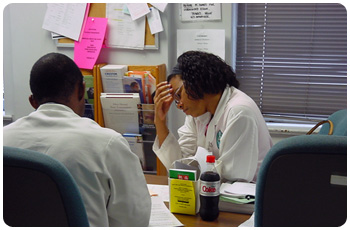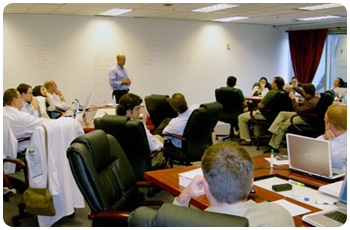Education is the rule at Tulane, and no program has the multi-faceted modalities to fit every learning style like Tulane. There are eight components to the Tulane Resident’s curriculum. For all eight components, the following philosophical tenets hold true:
- Learning should be fun, not something you suffer through.
- You learn medicine by being actively engaged in it… not by passively listening to someone drone on as the power-point slides click by.
- It helps to keep the lights on (i.e., no powerpoint lectures).
- There is little to be gained by learning what you already know. Instead, the maximal “juice for the squeeze” comes from identifying those areas in which you are weak (or your blind spots), and then shoring up those weakness.
- Medicine is a team sport. Learning in the context of a team of colleagues is more fun than learning alone, and adds the benefit of teaching team skills.
- Some skills require actively doing the skill. Tulane University’s state-of-the-art, six-million dollar virtual hospital (simulation center) is just the ticket to practice your procedures and codes in a multi-disciplinary setting.
- The curriculum should provide balance in your life, making you a better person, as well as a better physician. Check out the CAS curriculum as an example.
The Eight Pillars of the Tulane Resident’s Curriculum are listed below:
- Friday School and Monday School
Wow, are you going to love this! Friday School is the most innovative and forward-thinking curricular innovation in the country. Click on the link to see Friday School in Action!
- Resident Rounds
Autonomy is a feature of the Tulane resident’s experience, and resident rounds epitomizes this principle. You can only learn medicine by actively making decisions, and it is the protected three hours of resident rounds each day that enables Tulane residents to learn the important skill of making decisions. Learn more about work rounds in “A Day In the Life.”
- Afternoon Delight (aka "Morning Report")
Afternoon Delight (Tulane’s version of “morning report”) is not a lecture- it is a graduate-level discussion conference where the residents do the talking. Learn more about Afternoon Delight in “A Day In the Life.”
- Attending Rounds
Attending rounds is not a time where you watch your attending write notes, nor is it a time where the attending merely flips cards while you stand passively by. Attending rounds at Tulane is the old-school model of learning medicine at the bedside. Because there is nothing to rush off to (i.e., no noon conference (Friday School), or clinic ( “The 4+1”)) attending rounds is relaxed and focused upon your learning. Learn more about attending rounds in “A Day In the Life.”
- Afternoon Teaching
The learning doesn’t stop when the work is done. Each resident at Tulane is trained in the art and science of medical education, and after this formal training the expectation is clear: All residents at Tulane are expected to teach their team. Learn more about developing mastery in clinical education at Tulane in “Learning to Teach.” Add in the benefits of “The 4+1” System, and you’ll see the benefits of having additional “resident-to-intern” teaching time each and every day of your residency.

- Standing Conferences
Grand Rounds, M&M, and ICU report: Grand Rounds occurs each Wednesday at noon, featuring a roster of Tulane faculty and visiting professors from around the country presenting the latest in scientific advances. The last grand rounds of each month is devoted to the Quality and Patient Safety M&M, whereby a case occurring in the previous month is reviewed as to how we could have optimized the system to ensure better quality and patient safety. This systems-focused conference is consistent with the program’s core beliefs: we believe in a “no yell culture,” as no blame is assigned, and we believe that we can always improve our system to continually put good people in good positions. Following each Grand Rounds/M&M, the residents and ICU faculty/fellows engage in ICU Report, focusing on the most complex ICU cases seen over the previous week, further optimizing the residents’ ability to manage even the most complex of medical illnesses.
- C.A.S.
CAS is the “Curriculum for Additional Skills.” In this longitudinal curriculum, you will have a half-day every four weeks (as a part of your “+1” week) to be with your firm to engage in an assortment of activities you will not find in the typical residency. And you’ll have one-on-one time with Coach Wiese. No program in the country will give you more person-to-person access with the program director like Tulane !
In addition to time in the simulation center, engaging in the firm’s quality improvement project, curricula in research basics, learning how to teach, you’ll also be engaged in all things not medicine … you’ll read literature, philosophy and current events… share in the interpretation of art and music…. All of the things that makes life worth living. Topics and readings are chosen by Dr. Wiese and your firm, introducing new thoughts that you might not have otherwise considered. And this is important as you care for the diversity of Tulane’s patients.., being able to speak with them on a level they understand… and to the topics for which they most care… is the key to being the ultimate physician.
Tulane is about generating academic physicians, because we believe that all evil in this world exists because good people did nothing. The Tulane resident has the right soul, and the right intentions in life… and with that in hand, the role of the Program is to ensure that she has the skills to make an exponential change in the world. Being exponential might come in the form of teaching, research or leadership… or a combination of all three. The CAS curriculum is designed to ensure that you leave the Tulane Team with those exact skills, ready to make that change in the world that the world so desperately needs.
- Phaedrus
If Tulane was not innovative enough for you, wait until you see this! As they say, you cannot, by definition, see a blind spot. Put another way…. Let’s say you see a patient... after working through it, you identify what you know, and what you don’t know. Great…. But are you sure there aren’t still some things you need to know (i..e, your blind spot)? What if there was a magical system that knew exactly what you did in a day… without you having to do any extra work at all. And what if, at the end of each day, you came home to an email from that magical system that told you exactly what you needed to know about the patients you saw that day? Not everyone else’s patients…. Your patients. How cool what that be? Be on the look out for Tulane’s Newest Innovation… it’s coming soon!

